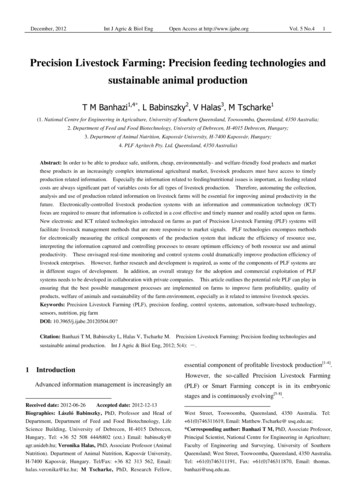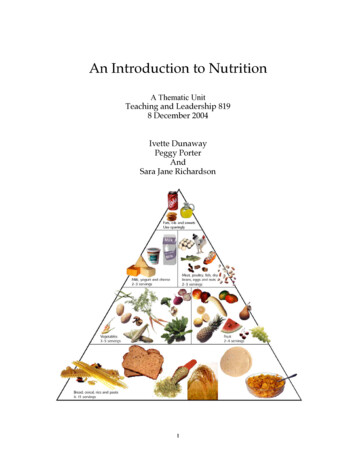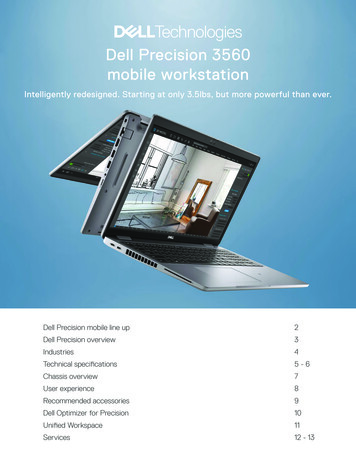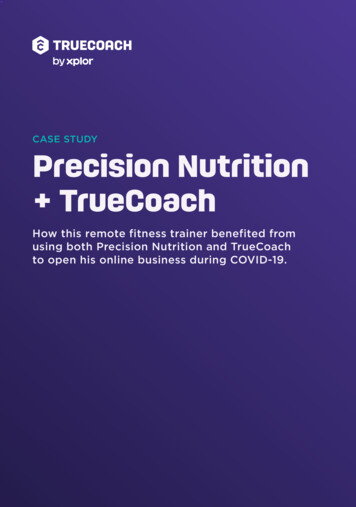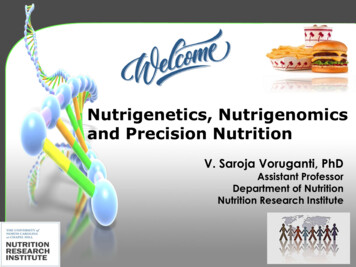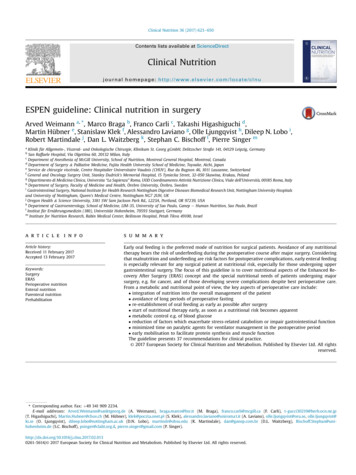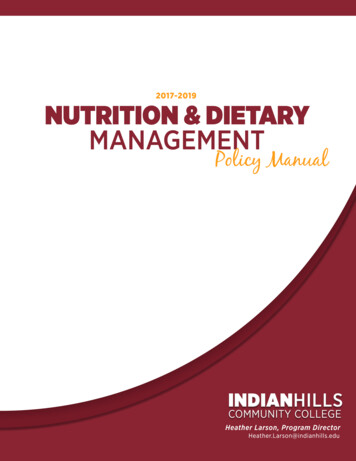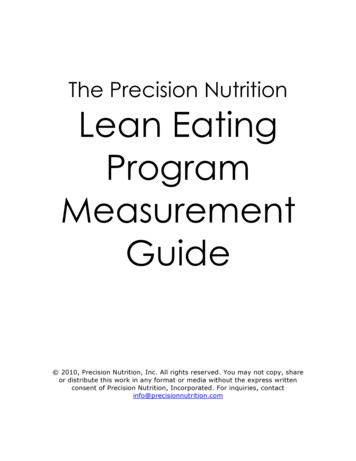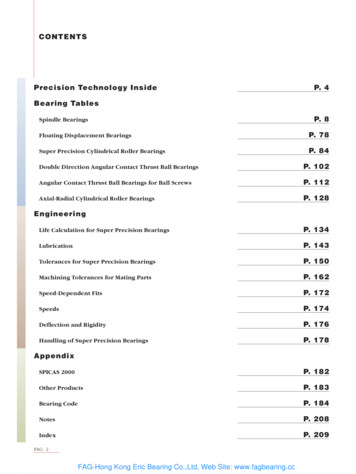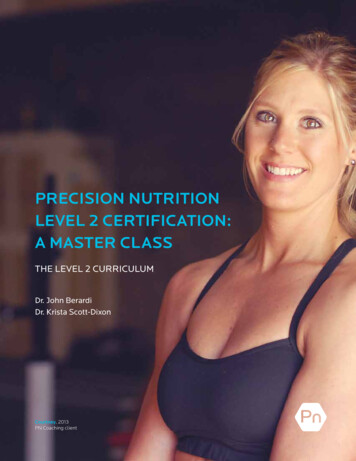
Transcription
Precision NutritionLevel 2 Certification:A Master ClassThe Level 2 CurriculumDr. John BerardiDr. Krista Scott-DixonCourtney, 2013PN Coaching client
Coaching isn’t about how much you know.Or how many letters are after your name.Precision Nutrition Level 2 Master Class Curriculum1
It’s how well you can communicate. Connect. Care.Build trust. Learn. Observe. Guide and teach.Rachel, 2013PN Coaching clientPrecision Nutrition Level 2 Master Class Curriculum2
Help people navigate their priorities, values,and messy real lives.Marty, 2013PN Coaching clientPrecision Nutrition Level 2 Master Class Curriculum3
It’s how well you can coach.To help rebuild bodies and spirits. To heal and empower.Kevin, 2013PN Coaching clientPrecision Nutrition Level 2 Master Class Curriculum4
To coach elite athletes to top performance.or just help “real people” be a little bit better.Kim, 2013PN Coaching clientPrecision Nutrition Level 2 Master Class Curriculum5
Want to become a coach? We’ll teach you.Want to coach better? We’ll teach you that too.Robin, 2013PN Coaching clientPrecision Nutrition Level 2 Master Class Curriculum6
Want to be among the best coaches in the world?The sky’s the limit.Ryan, 2013PN Coaching clientPrecision Nutrition Level 2 Master Class Curriculum7
Welcometo the programthat’ll transformyour coachingforever.
About the Precision NutritionLevel 2 Master ClassThe Precision Nutrition Level 2 Master Class is a comprehensive nutritioneducation, mentorship, and internship program, in which you’ll get: The exact training program we use to onboard our in-house Precision Nutrition super coaches. ne full year of daily lessons, hands-on practice, and personal coaching from us on how to be aObetter coach. ehind-the-scenes access to the Precision Nutrition “toolbox”, filled with coaching tools,Btechniques, and tips you can use immediately with your own clients. Individualized guidance and supervision from a Precision Nutrition super coach. pplied coaching methods and resources that you can start practicing and implementing with yourAclients right away. A private forum where you can ask questions, network with, and get support from your peers. egular evaluation and assessment to ensure that you stay on track, consistent, and accountable —Rand to help you learn more about your own learning process. ase studies — drawn from our own coaching programs — that help you practice your problemCsolving, address real people’s real issues, and explore some of the most current research in the fieldof nutrition. aily instruction that teaches you what you need to know — and do — to start improving yourDcoaching immediately. Real-time coaching, solving real-world client problems — drawn from our own client roster. Progress tracking and assessment tools, so you always know how you’re doing. Online learning that fits your needs as a busy health and fitness professional. And a whole lot more.Precision Nutrition Level 2 Master Class Curriculum9
About your coachesYou’ll get to learn from the very best in thebusiness, including:Dr. John Berardi, the head coach of the Precision Nutrition Level 2Certification Master Class. He’ll be sharing his secrets and makingsure you’re on track to success.John Berardi, PhD is a founder of Precision Nutrition, the world’s largest online nutrition coaching andcertification company. He also is an advisor to Apple, Equinox, Nike, Titleist, and more.He has columns at Livestrong.com and the Huffington Post. And was recently selected as one of the 20smartest coaches in the world.“ Mentors and coaches have made all the differencein our lives. That’s why we started PrecisionNutrition — to pay that forward. To help others findthe mentorship and coaching they need.”In the last 10 years, Dr. Berardi and his team have personallyworked with and mentored over 15,000 fitness, health, andnutrition professionals through the Precision NutritionCertification program.Precision Nutrition Level 2 Master Class Curriculum10
About your coachesDr. Krista Scott-Dixon, PN’s lead curriculum developer, certifiedcounselor, and recognized coaching ninja, will co-direct the program.Krista Scott-Dixon, PhD, has been with Precision Nutrition since the beginning. She’s directed — and written the curriculum for — PN Client Coaching. She’s also created the curriculum for the PN CertificationLevel 2 Master Class.Krista brings over 15 years of research, teaching, and coaching experience to her role, along with extensive training in nutrition and counselling. As a former researcher in the field of work and public health,she deeply understands the demands clients face in trying to balance jobs, family, self-care, and lifein general.As a previously “unathletic” person who discovered the joys of exercise later in life, she’s inspiring, fit,funny, and ridiculously smart.“ Making change can be a big deal — for both you as acoach, and for your clients. We’ll give you the credibilityand confidence you need to help people transformtheir lives. And we’re here with you all the way.” You’ll also get to work with PN’s world renowned teamof experts including Ryan Andrews, Brian St. Pierre,and more.Talk about a dream team.Precision Nutrition Level 2 Master Class Curriculum11
About your curriculumWelcome to the PN Level 2 Master Class!This course is all about developing hands-on, “real-world” coaching practices and skills.In fact, it’s the exact training program we use to onboard our own full-time, in-house Precision Nutritionsuper-coaches.So, whether you’re a fitness trainer, a nutritionist, or another kind of health care provider, what you’ll learnhere will help you coach confidently and competently, and at a world-class level.With this knowledge, you’ll better serve clients, helping them make important — possibly even life-saving— changes to their health, wellness, and athletic performance.More than that, you’ll be able to grow a sustainable business that thrives where other coaches might struggle.If you’re ready to be something more than the average trainer,we’re ready to show you something amazing Precision Nutrition Level 2 Master Class Curriculum12
What will you learn?By the end of this Level 2 certification course, you’ll be able to: Be a self-aware and self-questioning coach. You’ll look at coaching as an active practice that requires constant care, growth, and development forongoing improvement. Develop strong working relationships with clients. You’ll learn how to use a client-centered approach, emphasizing empathy and the “coaching alliance”. Be able to guide clients through all stages of the nutritional coaching and consultation process. You’ll develop a broad-based and robust system of theory and practice for client nutritional management,regardless of whom you’re working with or when. Understand what’s truly important. You’ll learn to identify, understand, and prioritize key coaching and nutrition concepts, principles, andideas, as well as distill practical applications from broader, more abstract theories. Use the right tools and techniques for the job at hand. You’ll learn and practice a wide range of skills and coaching methods, and learn when to choose thecorrect ones for clients. Treat clients as unique individuals, addressing their needs holistically.You’ll understand what factors shape clients’ coaching needs, process, and outcome, such as: activity limitations and disabilitysex/gender, age, ethnicity, culture,and other demographic factors stage of readiness for changeconfidence and preparednesspreferred coaching and learning styles Work effectively on your own and as part of a team. Whether you’re self-employed or part of a larger organization, you’ll learn how to play well alone andwith others. Solve complex problems thoughtfully.No more being intimidated by “complicated clients”! Communicate clearly and effectively. We’ll teach you a variety of methods for both verbal and nonverbal communication, as well as writing,speaking, and other communication tricks. Act, work, and present yourself as a respected professional. You’ll learn to serve as an “ambassador of the industry” committed to integrity, courtesy, collegiality,and “best practices”. Develop your own self-sustaining “growth practice”. You’ll learn how to learn, how to seek feedback, and how to keep developing and improving for yourentire coaching career.Precision Nutrition Level 2 Master Class Curriculum13
What we expect from youAs a student, you should expect to learn a lot from us, and to gainskills that will help you in your own coaching.Here’s what we expect from you. That you dedicate at least 20-30 minutes daily to this program. Along with the work of solving case studies, preparing assignments, and participating in forums —expect to allocate 3-5 hours per week to all work required in this course. That you have at least a few clients, whether formal or informal (e.g. friends, family, peers). We’ll ask you to test some stuff on people. All your coaching stuff has to work in the “real world”. Somake sure you’ve got some willing guinea pigs! That you’re dedicated to professional self-improvement and ongoing development in all aspects. We’ll ask you to develop your skills across all domains. It’s normal to be stronger in some areas, butyou must be willing to build a broad foundation.You’re the kind of coach who doesn’t want tosettle for mediocre results or just “punching the clock”.You believe in this work. Just like we do. That you work to discover your own strengths and your unique “best coach” approach. We want to produce coaches who are well-rounded and able to coach in their own style and practice. That you’re willing to work especially on written and verbal communications skills.No matter how awesome you are, you’ve got to be able to share that and sound smart when you do it. That you understand that this certification is more than “just another piece of paper”. It represents part of developing and adhering to standards of integrity, best practices, and excellencein coaching. That you’re able to commit for 12 months. Allowing for “juggling” around work schedules, life events, etc. We can accommodate these, but youmust be prepared to anticipate and manage any disruptions to your schedules and participation.Precision Nutrition Level 2 Master Class Curriculum14
A process-based programYou teach your clients that the journey and the process is important.Small daily choices and actions make all the difference.Same is true here.This is primarily a process-based certification course. You have to do stuff, and experience stuff,to “graduate”.Show upJust as with your clients, the outcome at the end is less important than the quality of what you’reable to do, every day.This program is about how well you work through problems, devote yourself to the practice of your coachingcraft, and work with others to gain skill mastery and understanding.As a coach, you don’t just want information. You want wisdom, judgement, analysis, and intuition. Youwant to be able to coach real people with real lives in the real world. And all of that requires practice.We’ll ask you to do certain tasks regularly, work through tricky problems, and call upon your experience.Daily coaching practicesAs we’ve stressed, coaching must be learned through daily practice and experience. You can’t just readabout it. You have to do it. Over and over and over.So every 2 weeks, we’ll give you a new task (aka a coaching practice, or habit) to practice every day.Habits will emphasize professional development and some personal skills that will develop and contribute to an effective coaching practice.Case studiesWorking with real client problems is where the “rubber hits the road” and you have to test yourtheories and ideas.24 case study assignments throughout the program let you practice technical nutrition knowledge andresearch skills, and work through a challenging client situation, applying the tools, concepts, and lessonsfrom the previous weeks.QuizzesEvery other week, you’ll do a short multiple-choice quiz that tests your recall and understanding ofthe previous block’s material.Self-assessmentEvery other week, we’ll ask you to think about and assess your own progress. You’ll judge yourself basedon your own criteria.Precision Nutrition Level 2 Master Class Curriculum15
Program scheduleIntroduction: Building a coaching foundationWeekThemeOverview1Introduction Orientation & introduction2Coachingfoundations What is a coach? Outcome-based decision making Client-centered coaching Coaching for sustainability and longevity Intro to the case-study/problem-solving format and weekly schedule Measuring your own progress & self-development3Knowyourself Your coaching values Your coaching identity Your coaching goals4The mindful coach Stress, recovery, and workloadProducing coaching knowledgeWeekThemeOverview5Activethinking How to go from general theories to specific concepts6Measuring &assessing clients Developing & using meaningful indicators & assessment tools7Measurement &assessment theories Outcome-based decision making How to prioritize information & ideas Getting beyond nutritional dogma; how to test and evaluate nutritionalparadigms, fads, theories, etc. Types of metrics; when and where to apply them8Goalsetting Helping clients take action9Learning style — self What are learning styles — and what’s yours?10Learning style —clients Identifying and assessing client learning styles The awesomeness-based coaching method and solution-focused therapy How to communicate key concepts and instructions for diverse learning stylesPrecision Nutrition Level 2 Master Class Curriculum16
Coaching psychology part 1: The embodied coach and clientWeekThemeOverview11Somatic psychologyand the embodiedself – coach Physical and embodied learning, somatic psychology; body awareness12Somatic psychologyand the embodiedself – client Building body awareness in clients Teaching mindful & slow eating; 80% full; teaching client to recognizehunger signals Emotion and client motivations13Self-compassion vsself-criticism – coach Compassion vs criticism; “impostor syndrome”14Self-compassion vsself-criticism – client Neurology of self-talk Using assessment tools to identify triggers and habits Mindfulness and compassion: beyond a “positive attitude” towardsmeaningful actionCommunication in coachingWeekThemeOverview15Receiving nonverbalcommunication Building empathy & connecting with clients16Giving nonverbalcommunication Self-presentation; professionalism and courtesy in coaching17Coaching eatingbehaviour Communicating clearly about eating18Coachingmovement Communicating clearly about coaching movement and physical activity19Making nutritioncoaching fun How to assign goals and give feedback20When things getweird Dealing with client shame, fear, anxiety, defensiveness etc. aroundnutrition & exercise coaching How to talk so clients listen Introduction to disordered eating When/how to refer outPrecision Nutrition Level 2 Master Class Curriculum17
From theory to actionWeekThemeOverview21Coaching for change:Change talk Motivational interviewing & change talk22Coaching for change:managing resistance Dealing with resistance; when to fire clients23Habit-basedcoaching: actionplans Preparing your clients for action; clearing obstacles and tion Special populations and individualizing programming25Journals and recordkeeping Collecting and interpreting client data26Disordered eating Disordered eating and “food addiction”: what does “normal eating”look like?Shaping the pathWeekThemeOverview27Shaping the path:Environment The role of the social and physical environment28Shaping the path:Time Getting the most out of limited time and coaching sessions Building the proactive clientCommunication for changeWeekThemeOverview29Crucialconversations Building professional and personal relationships in coaching30Crucialconversations Managing conflict and client emotions productively Team-based workPrecision Nutrition Level 2 Master Class Curriculum18
Coaching psychology 2: Mental skills trainingWeekThemeOverview31Mental skillsfor coaches Introduction to mental skills training32Mental skillsfor clients Mental skills training for clients; enhancing client resilience33Proactivity The proactive coach and client34Meal planningand prep Positive self-talk; stress management Helping clients plan, schedule, and manage Meal plans that don’t suck Sharing the joy of foodWorking in the real worldWeekThemeOverview35Complete coach,complex clients Bringing your full self and skills to the job36Team-basedwork Working within a large organization and a multi-disciplinary team Working with clients’ other care providers (e.g. doctors, physios) When/how to refer out; what questions to ask/answer; what information to gather37Activitylimitations Working around activity limitation and medical issues38Foodsensitivities Dietary preferences and intolerances Regressing and simplifying habits Health & nutritional concerns of common dietary paradigms GI health, immunity, and the enteric nervous system The physiology of taste & food preferences39Supplementation 140Supplementation 2 Appropriate supplementation use Evidence-based recommendations and outcome-baseddecision making Supplement & common drug usePrecision Nutrition Level 2 Master Class Curriculum19
Population-based nutrition coaching across the life cycleWeekThemeOverview41Sex differences 1:Introduction The continuum of sex differences: Physiological individuality andshared features42Sex differences2: Hormones &structure Hormones and reproduction43Gender:Psychoneuroimmunology “Deep health”, stress, and immunity44Gender: Behaviors,beliefs, and habits Health behaviors45Athletes 1 Athletic nutrition – special scenarios46Athletes 2 Athletic nutrition – inflammation and supplementation47Youth &family Pregnancy and post-partum nutrition48Families andaging Life stages & aging Work Working with youth & familiesBuilding your coaching businessWeekThemeOverview49Building a coachingbusiness How to establish and grow an effective coaching business50Wrap up &review Lifelong learning; growth mindsetPrecision Nutrition Level 2 Master Class Curriculum20
Certification Level 2Sample LessonEvery day you’ll work on lessons designed to: teach you something awesome about nutrition, training, or change psychology, help you learn something about yourself, facilitate better communication with your clients, or put all the things you’re learning into practice.Here’s a look at one sample lesson. (Remember, you’ll be introduced to a new one nearly every day.)SAMPLE LESSONThe complexity of coachingTake a second and ask yourself:What is a coach?It’s a simple question about a complex job. For instance: Coaches teach but they aren’t only teachers. Coaches know things but they aren’t only subject-matter experts or “authorities”. Coaches create hypotheses, gather data, and do analysis but they aren’t scientists. Coaches motivate people but they aren’t only cheerleaders. Coaches direct clients but they aren’t “bosses” or “managers”. Coaches help clients come up with a plan but they aren’t only planners. Coaches know that nutrition problems aren’t just about food but they aren’t shrinks. Coaches have a vision but they also get their hands dirty.You see the dilemma.Coaching is all of this, and more. Coaches must bring a wide range of skills to theirprofession.Precision Nutrition Level 2 Master Class Curriculum21
SAMPLE LESSONThere’s also lot of fuzzy, indefinable stuff about being a coach, what we call “gut coaching”. Or you might call it “intuition” or “wisdom”. Stuff that, with enough experience, youjust know, but you aren’t exactly sure how you know it.For example: How do you sense when a client is struggling? How do you sense when to push, and when to back off? How do you sense when a client is just about to make a breakthrough?Notice how we use the term “sense” here?We’ll be coming back to that in subsequent weeks. We’ll encourage you to developyourself as a “whole-body coach” — in other words, to use your left-thinky-brain logicand analysis, but also your right-feely-brain sensing, intuiting, and creativity, and yourdeeper brain functions such as: your limbic system (for collaboration, communication, and empathy); and your sensory input (for reading important non-verbal client cues); and y our motor cortex (for demonstrating and “reading” movement and clients’ somatic[body] state).You might be naturally inclined to use some abilities more than others, and we’ll get tothat soon — for example, when we talk about coaching styles.However, just get the general idea: coaching is more complicated than you might think.Yet, at the same time, coaching is one of the most natural things in the world. Wehumans are wired to teach and guide others. To help others navigate the world. And tocollaborate in the pursuit of knowledge and growth.What is a coach?So, what is a coach? There are lots of definitions, but here’s one of ours:A coach is like a tour guide to a place where you already live.Let’s say you live in a city that seems fairly familiar. But one day, maybe you read up on the history of your city, and realize that many fascinating things happened just on your street. a friend says “Hey! Let’s try that cafe down the street!” and you realize that you’vewalked past that place 100 times without noticing it.Precision Nutrition Level 2 Master Class Curriculum22
SAMPLE LESSON y ou buy a bike and discover it’s much more efficient than your car for gettingthrough rush hour traffic. y ou walk down a new street that you don’t normally take, and discover a delightfullittle hidden park.That’s what a coach does: she helps you explore the potential and the resources that youalready have around you and inside you, then put that potential and those resources intoaction — perhaps past the limits that you may have inadvertently set for yourself. Maybe that comes from new information. Maybe that comes from helping you see things in a new way. Maybe that comes from giving you a new tool or strategy. Or a good action plan. Maybe that comes from pushing you out of your comfort zone.A coach sees clients as diamonds in the rough. He sees good raw material that justneeds a little help with polishing. He sees the glass half full.A coach is not: a parent a judge a BFF an enemy an all-knowing guruA coach is more like: a tour guide a midwife a set of signposts and a good map an instruction manual (that is actually helpful and not written in poorly translated English)Your clients are travelers. You’re the guide. A navigator. Someone with a map and theskills to help clients read and interpret it. Someone to walk the path beside them.Sure, occasionally you might step in front of them to lead, or behind them to push them,but most of the time, you’re beside them, keeping them going in the right direction —sorta like a sneaker-wearing sheepdog. This is a method and approach we call clientcentered coaching.Precision Nutrition Level 2 Master Class Curriculum23
SAMPLE LESSONWhat does a coach do?Here’s a quick reference to the practice of coaching.As a coach you have four key tasks:1.2.3.4.Define clearly what must be done.Develop a plan to do it — in collaboration with the client.Enable the means to execute it.Build relationships that make this possible.This course will give you these four skills.For the next couple of weeks, we’ll focus on the first task.More immediately, tomorrow, we’ll talk about client-centered coaching and why we thinkyou should adopt it as a style. (Hint: It works.)For today, consider the question:What is a coach?And also:Why do YOU want to be a coach?We’ll come back to this question next week.WHAT TO DO TODAY1.Remember that coaching is both an art and a science. Much about coaching is intangible. And you synthesize lots of different skills andabilities to do it. We’ll argue in favor of “whole-person coaching” throughout thiscourse — both for yourself, and for your clients.2. Consider your own definition of what coaching is. Plus think about why you want to do it. And why not start a discussion in the forumon this topic?3. L ook ahead to your upcoming schedule and book those appointments with yourself. Whatever your definition of a coach, one thing’s clear: A good coach plans, prepares,and commits to the development of his or her coaching practice.Once you’ve done that for today, tick off your daily practice.Until tomorrow,The PN Coaching TeamPrecision Nutrition Level 2 Master Class Curriculum24
Certification Level 2Sample QuizEvery two weeks you’ll complete a short quiz. These quizzes are oneof the ways you’ll be evaluated during the program.Just so you know, the quizzes aren’t designed to “trip you up”. They’re not rigorous assessments. And youdon’t have to “study” for them.Rather, the quizzes are just another chance to grow. They’re in place to help you see the material from a different perspective. And, in doing so, deepen your learning.Here’s a look at a sample quiz.SAMPLE QUIZSample quizQuestion 1Knowledge is: (a) important in a coaching practice. (b) not enough to change client behaviour. (c) something that is given to us. (a) and (b) (a), (b), and (c)In 1-2 sentences, explain why you chose this response.Precision Nutrition Level 2 Master Class Curriculum25
SAMPLE QUIZQuestion 2What does it mean to say that “knowledge is constructed”? That we actively assemble knowledge from ongoing input along with pre-existingexperiences and other knowledge. That we can never really “know” anything. That we have to do many higher-order thinking skills. That there are different ways to know things. That we need to comprehend the information we know.Question 3Why is awareness a useful tool for coaches? It’s simple and easy to apply. Awareness itself can change behaviour. It keeps clients focused on what they can do right now. It helps clients notice and name their own triggers and habits. All of the above.In 1-2 sentences, explain why you chose this response.Question 4Choose all that apply. Good stress: lasts a long time is infrequent is over quickly (in a matter of minutes or hours) is ongoing breaks you down — it leaves you worse off than you were before always improves performance, no matter how strong the stressor depends on contextPrecision Nutrition Level 2 Master Class Curriculum26
SAMPLE QUIZIn 1-2 sentences, explain why you chose this response.Question 5Choose all that apply. The primary brain structures involved in habit formation are: the amygdala the insula the visual cortex the anterior cingulate basal ganglia the frontal cortex the hypothalamus the temporal lobeIn 1-2 sentences, explain why you chose this response.Precision Nutrition Level 2 Master Class Curriculum27
Certification Level 2Sample Case StudyEvery two weeks you’ll also complete a case study. These are anotherone of the ways you’ll be evaluated during the program.Fair warning: We’ll be deliberately throwing you some tough stuff during these simulations. We’ll give you the“trial by fire” by asking you to work through difficult and puzzling client scenarios.You make your mistakes now — with us guiding, mentoring, and helping you out, as well as offering you feedback at key moments — so you make fewer mistakes later.(You’ll still make mistakes, of course. We all do. You’ll just get better at fixing them and learning from them!)Have a look at one of our favorite case studies from the program.SAMPLE CASE STUDYSample Case Study:Assessing Body CompositionThis week, we’ve been exploring the concept of knowledge production — how do we knowwhat we know? And are we making the best use of that knowledge for our coaching?Next week, we’ll be looking more closely at measuring client progress. For example,what is important to test and assess? What indicators are most relevant and importantfor each client?Today’s case study takes up both these themes of knowledge production and assessment.Case Study Assignment #2Your new client Maria is a middle-aged woman who is interested in losing body fat to improve her health. In particular, Maria is concerned about the relationship between bodyfat and health problems like heart disease. She wants to know things like:What is the best method of measuring body fat?What is the relationship between body fat and heart disease?Precision Nutrition Level 2 Master Class Curriculum28
SAMPLE CASE STUDYLuckily, you’ve just come across a few relevant studies that might help answer her questions. Problem is, these studies are pretty technical and Maria’s just a beginner withminimal nutrition and fitness knowledge.Frankly, you’re not 100% certain you can make sense of these studies either. But, armedwith your trusty Level 1 Certification textbook (The Essentials of Sport and ExerciseNutrition) for reference, and your own assessment tools, you’re willing to try.Here’s your assignment. Make sure you have read and understood all the instructions.1.Download and read the following four studies. alidation of Five Simple Models Estimating Body Fat in WhiteVPostmenopausal Women revalence of Obesity and the Relationship between the Body Mass Index andPBody Fat he Relationship of Waist Circumference and BMI to Visceral, Subcutaneous,Tand Total Body Fat ody Composition and Body Fat Distribution in Relation to Later Risk of AcuteBMyocardial Infarction2. R eview the 7-site skinfold measurement assessment sheet in the Level 1 certification
counselor, and recognized coaching ninja, will co-direct the program. Krista Scott-Dixon, PhD, has been with Precision Nutrition since the beginning. She's directed — and writ-ten the curriculum for — PN Client Coaching. She's also created the curriculum for the PN Certification Level 2 Master Class.

